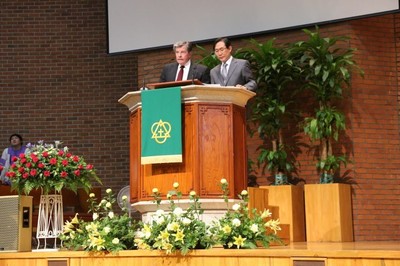Since its founding in 1901, the Presbyterian College and Theological Seminary has moved from Pyongyang ― now the capital of North Korea ― to Seoul, temporarily closed in protest of Japanese rule and sent out more than 20,000 graduates into ministry.
The seminary now focuses on spiritual training, scholastic cultivation and application of the gospel.
With a master of divinity program and bachelor’s degrees in theology, Christian education and church music, the seminary educates many leaders in the Presbyterian Church of Korea (PCK), a partner church of the Presbyterian Church (U.S.A.). Representatives of the PC(USA) were in Seoul this week to celebrate the PCK’s 100th anniversary and attend its General Assembly.
The seminary also houses nine research institutes, trips to the Holy Land and a center for world mission. Students — 30 percent of whom are female — are required to serve in local churches and perform community service while taking classes.
After a tour of the seminary, an 18-member PC(USA) delegation here to help celebrate the centennial of the Presbyterian Church in Korea joined students for an afternoon worship service. The Rev. Robert Bohl, former General Assembly moderator and chair of Princeton Theological Seminary’s Board of Trustees, preached.
“We in the United States have so very much to learn from you because of your faithful commitment to Christ,” Bohl told the seminary, adding that the PC(USA) “stands in awe” of Korean Presbyterians.
Bohl is approaching his 75th birthday — a milestone that has made him very curious about the future. We’re all curious about the future, but we continue to live in the past, he noted.
“So powerful is the influence of the past that it is almost as if we are determined to live life backwards,” Bohl said.
Maybe we’re afraid to accept responsibility for the future, he continued. Maybe we’re worried that the best has already happened. But life is lived forward, he said.
We often forget that Jesus had a childhood and matured into an adult, placing his entire trust in God. Maybe that’s why Jesus became disturbed when he met people who were wasting their lives, Bohl said.
Preaching on the story of the man who laid for 38 years on the mat outside the healing pool of Bethesda, Bohl questioned why no one had offered to help the man into the waters. Maybe the man had never tried to help himself. Was the man on his mat because he was lame, or was he lame because he didn’t get off his mat?
“Self-pity is a very dangerous thing in a person’s life,” Bohl said.
Jesus was no impressed with the man’s excuses and told him to get up and stop wasting his life. Those words echo down to us, Bohl said.
“Do you want to change, or do you want to stay the way you are the rest of your life?” he asked. “What are we to do with the desire to live life over?”
First, we must admit that living life again is impossible. We often worry too much about what other people think of us and not enough about what God thinks of us, Bohl said.
Instead of worrying about what we want to do and what we want to have, we should all think about who God wants us to be, he said.
Most students at the Presbyterian College and Theological Seminary are young and should be asking themselves what God expects of them. Their future is wide open and is more important than the past, Bohl said.
He urged the congregation to remember Paul’s exhortation to the Philippians to forget the past and press on toward the future, with the goal of being as much like Jesus Christ as possible.
“Always try to do precisely what you believe Jesus Christ wants you to do,” Bohl said. “God will bless you richly if you do that. Remember, it does not matter what others think of you — the only thing that matters is what God thinks of you.”

